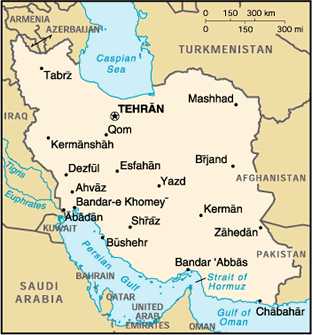The other Iranian strike
 George Bush and Iranian President Mahmoud Ahmadinejad may be busy squaring-up in the hopes of demonstrating that their wang is bigger than the other guy's, but away from the media spotlight, Iran's internal struggles look like they are hotting up. Although strikes are illegal in the Islamic Republic, the country's unions are putting their British counterparts to shame:
George Bush and Iranian President Mahmoud Ahmadinejad may be busy squaring-up in the hopes of demonstrating that their wang is bigger than the other guy's, but away from the media spotlight, Iran's internal struggles look like they are hotting up. Although strikes are illegal in the Islamic Republic, the country's unions are putting their British counterparts to shame:Angered by unpaid salaries and generally low wages, workers in the northern Iranian provincial capital Rasht blocked streets and protested in front of government offices a fortnight ago brandishing banners that read: "We are hungry!" It wasn't the first time that thousands of employees at the country's largest state-owned textile factory had laid down their tools. But this time they were joined by dam workers in the western province of Elam and employees of a pharmaceutical factory in Tehran. Recently, workers have also gone on strike against harsh work conditions and impending layoffs in mines and petrochemical plants across the country, with hundreds of coal miners from the northern province of Gilan protesting the fact that they have not been paid for 13 months. Workers were also on strike in the car factories of the Iran-Khodro company, already the site of a massive work stoppage on last year's Day of Social Welfare and Securities (July 16), when strikers demanded the introduction of a minimum wage.Ahmadinejad rose to power on the back of a campaign characterised by political and economic populism. It is the former which has perhaps acheived the most attention and expressed itself in militaristic posturing, anti-Semitic rhetoric and a vicious anti-gay crackdown. His promises to improve living conditions and raise incomes, however, appear to have fallen by the wayside. According to the Iranian Central Bank, more than half the population live below the poverty line, defined as €230 ($280) a month for a family of five.
The current wave of strikes was initiated by bus drivers in Tehran in January. The government response was immediate and harsh: several hundred drivers were incacerated within hours of the strikes commencement. One of the strike leaders, Mansur Hayat-Ghebi was held until March 19 and then re-arrested shortly after. He was finally released again on April 10 after being on hunger strike for several days. The strike had originally been called to demand recognition of the union and collective bargaining and for the release of Mansoor Ossanlou who remains in prison where he has been held since December 22 without charge or access to lawyers. Reports suggest he is suffering from a number of medical conditions including a recently contracted skin condition. And Scargill thought he had a bad time of it with Thatcher!
The imprisoned drivers have been locked out without pay since their release and the Worker-Communist Party of Iran suggests that they are likely to lose their jobs for having the temerity to stand up and demand their rights:
On 9 March the 'termination of contracts' of 46 workers - most union activists - was announced. Also, last Wednesday, 5 April, the workers, protesting outside the bus company's headquarters, were told that another 116 workers have been formally sacked, though no names were released.Digby Jones would love these guys if they ever had the misfortune of meeting him.
A 'disciplinary committee' is reportedly working its way through a long list of workers to be fired for their part in the strike of 28 January.
It appears that the international dimension of their struggle is not lost on the striking workers and the Syndicate of Workers of Tehran and Suburbs Bus Company sent a message of congratulation to French workers following the recent defeat of the CPE. It behooves those of us opposed to an attack on Iran and to the country's incumbent regime to do what we can to support those struggling within the Islamic Republic for a better society. If you want to find out how, start here or here.
File Under: Iran, News, Politics, Union



















<< Home